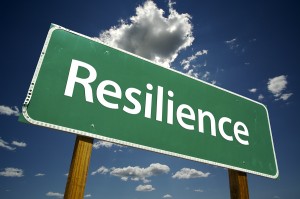Are you able to handle life’s ups and downs?
 When hardship strikes, do you have the right tools to endure?
When hardship strikes, do you have the right tools to endure?
You need resilience to be better equipped to face life’s misfortunes and unforeseen setbacks. Resilience may not be something that’s automatic to you and that’s okay. It’s a skill like any other that you can develop with practice and know-how. First, it’s important to know what it really is and how it can help you.
When you have resilience, you’re able to gather inner strength that helps you handle any situation without falling apart or going into deep freeze or isolation. Whether the challenge or momentary setback in your life comes from illness, or a loss of any kind such as a death or a disaster, you need to be able to bounce back with aplomb. Don’t linger in defeat or victim mode or dwell on the situation or feeling that it’s insurmountable or impossible to recover from. It usually isn’t.
We are always stronger than we think we are.
Your problems won’t necessarily disappear. It’s not like waving a magic wand, but with resilience you’re able to face those challenges with coping strategies and real solutions that give you the ability to go beyond them and rediscover more meaning and fulfillment.
It can help us better handle the stressful situations in our lives as well giving us options to recover from loss. The feelings of anger, physical or emotional pain, remorse or overwhelming grief don’t immediately disappear. However you have real methods to rise from them and meet your life and your goals and see the future with hope and even optimism.
Resilience is ongoing and not a quick fix approach. Remember you’re training or retraining yourself, especially from outdated coping techniques that don‘t give you what you need. It does rely on you taking action and putting in some time and effort to change your old habits.
Three Ways to Build Your Resilience:
1. Manage your feeling and emotions.
If you fly off the handle at the slightest disappointment, you’re building a mountain of stress that your body won’t be able to handle over time. You don’t have to ignore or hide your feelings, but if your emotions are over the top, find ways to harness them so that they’re less volatile. Exercise and physical activity help me get rid of those unwanted mood changes.
2. Build a Network of Connection.
There’s so much research regarding social interaction and health. We are social beings and need to feel supported and engaged with people. Strong, supportive relationships with loved ones and friends offer connection, love and acceptance that we all need. Often, when faced with a challenge, many people withdraw. If this describes you, lick your wounds and connect with even one person who cares and appreciates you and what you’re going through. Maintain or establish other connections in social groups and community action.
3. Make Each Day Special.
Okay, many times we go over the same mundane tasks, but there are moments that contain special meaning, and they need to be accentuated. Last Sunday, I was driving to the supermarket at just the right time that I saw the sky filled with a beautiful pink hue. When I got out of my car, I spent a few moments staring at the beautiful sky and thought “How special this moment was, how beautiful the sky and how lucky I was to be there at just the right moment to appreciate it.”
There are many moments each day like this that we don’t make time to appreciate. Reverse that habit and take a minute or two to notate it in your mind and in your heart. Fill each day with a sense of meaning and accomplishment and take a moment to wonder at the bounty. Whether it’s something your child or grandchild did or said, a natural occurrence like my pink sky, or a task well done, admire and marvel at it. That same moment only comes around once.
Jo Anne White, Ph.D., is a blogger for JenningsWire, a blogging community created by Annie Jennings.





